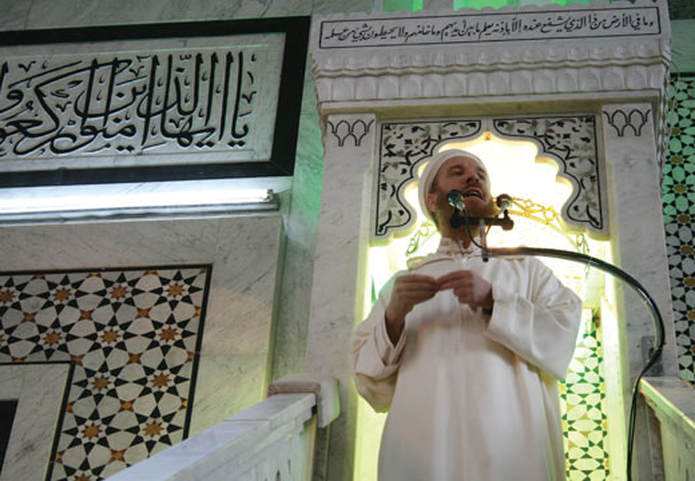|
TATIANA ANTONELLI ABELLA / JULY 2, 2010
Published in Syria Today Republished at http://goumbook.com/the-green-sheikh-damascus/ “Go to the mosque near the Dedeman Hotel and look for the man with the red hair.” These were the only directions I got when asked where I could find Sheikh Muhammad al-Yaqoubi, the mild-mannered Friday speaker and spiritual leader of the Al-Hassan Mosque near the Dedeman Hotel in central Damascus. The colour of Yaqoubi’s hair isn’t the only thing that makes him stand out. The 45-year-old is rapidly gaining a reputation as a local environmental pioneer and the only imam in Damascus focusing on the connection between Islam and the environment.The importance of reusing plastic bags and bottles, conserving water, and preventing pollution are just some of the green themes he has dedicated his Friday afternoon address to. He is very different from other sheikhs,” Zuhair Melah, a flower shop owner who has attended Yaqoubi’s Friday speeches for more than a year, said. Sheikh Muhammad, he said, has changed how he treats the environment. “We need to walk the true way,” Melah said. Yaqoubi believes that making the connection between Islam and conservation is important, particularly in Syria where environmentalists say a government-dependent mentality has left many residents unaware of – or uninterested in – the damage they are causing to their local environment. For decades, electricity was free. Water is cheap. Garbage men work through the night to pick up the litter that others have thrown to the ground. For Yaqoubi, who remembers being taught not to litter or spit on the street as a child in 1960s Damascus, it’s a painful sight. “It’s catastrophic,” he said. “You could cry when you see the litter and pollution in the city. I understand the frustration of Westerners and tourists who come here and see how polluted the streets are.” Still, the 34-generations-removed grandson of the Prophet Muhammad (ﷺ) sees his work less as an isolated mission and more as simply another lesson he must teach his fellow Muslims, particularly in an era when there is “a degradation of values in every area”. “This is not the only subject that I am fighting for every day,” Yaqoubi said. “We have so much to do. Environment, ethics, marital conflicts… The needs of humanity and Muslims in particular are like a map in front of me.” Sitting in a flat near the mosque and surrounded by piles of books, Yaqoubi details passages in the Koran which deal with the environment. There are many. While recycling is, of course, not discussed explicitly in terms of our modern plastic, paper and glass-separating world, Yaqoubi said the general principle spelled out in the Koran is very clear: don’t waste what you don’t need. “Our principle in Islam is that everything we have in our hands is not ours,” he said. “It is lent to us to use as long as we need it. It is our job to preserve it.” The Prophet Muhammad (ﷺ) was very clear about water pollution and conservation, forbidding believers from urinating in the forest, beside a river or on a tree and urging them to save water during their ritual ablutions. Yaqoubi started memorising and reciting portions of the Koran when he was five years old, growing up in a family in which “all the interest was in the sacred knowledge of religion”. Many of Yaqoubi’s fondest childhood memories are from the time he spent at the Umayyad Mosque where his father preached. Inspired by this man in whose hands “miracles happened”, Yaqoubi began giving Friday speeches at the age of 14. When he turned 18 he was officially appointed as a Friday speaker at the Al-Atassi Mosque. In 1990, his career took a momentous turn: Yaqoubi resigned from his job to devote his time to studying foreign languages. He travelled to the United States and Germany and focused on learning English and German in an effort to better equip himself to spread the word of Islam. Specifically, Yaqoubi said he worked to “create a new direction in the West for Muslims, one based on knowledge instead of protests and violence; a more spiritual approach”. After the events of 9/11, Yaqoubi said his goals have become even more important as he began to teach Muslims to focus on spiritual growth, rather than getting caught up incurrent events. Today, since returning to Syria three years ago, it is not only local, devoted Muslims Yaqoubi istrying to bring “back on track”. He is also reaching out to those who need a little prodding to make it to Friday prayers, to English-speaking visitors at Sheikh Mouheddine Mosque in Souk Al-Juma who want to learn more about Sufism, and to those who watch his speeches around the world via YouTube. Syria Today
1 Comment
|
MMXXII © Guidance Hub. Registered Charity (1173081) All Rights Reserved.
